The UMCRM Association had the joy of distributing $1.7 million in Ministry Impact Grants last year, funding 68 United Methodist camp/retreat ministry projects across the U.S. with a focus on future sustainability.
Learn more about the 2023 Ministry Impact Grants
UMCRM continues to receive reports of completed projects and we are eager to celebrate the vision, hope, and expanded ministry reach represented in these stories. Congratulations to these centers that successfully accomplished their grant-funded projects.
Camp Lakewood (IN) - Climbing Tower
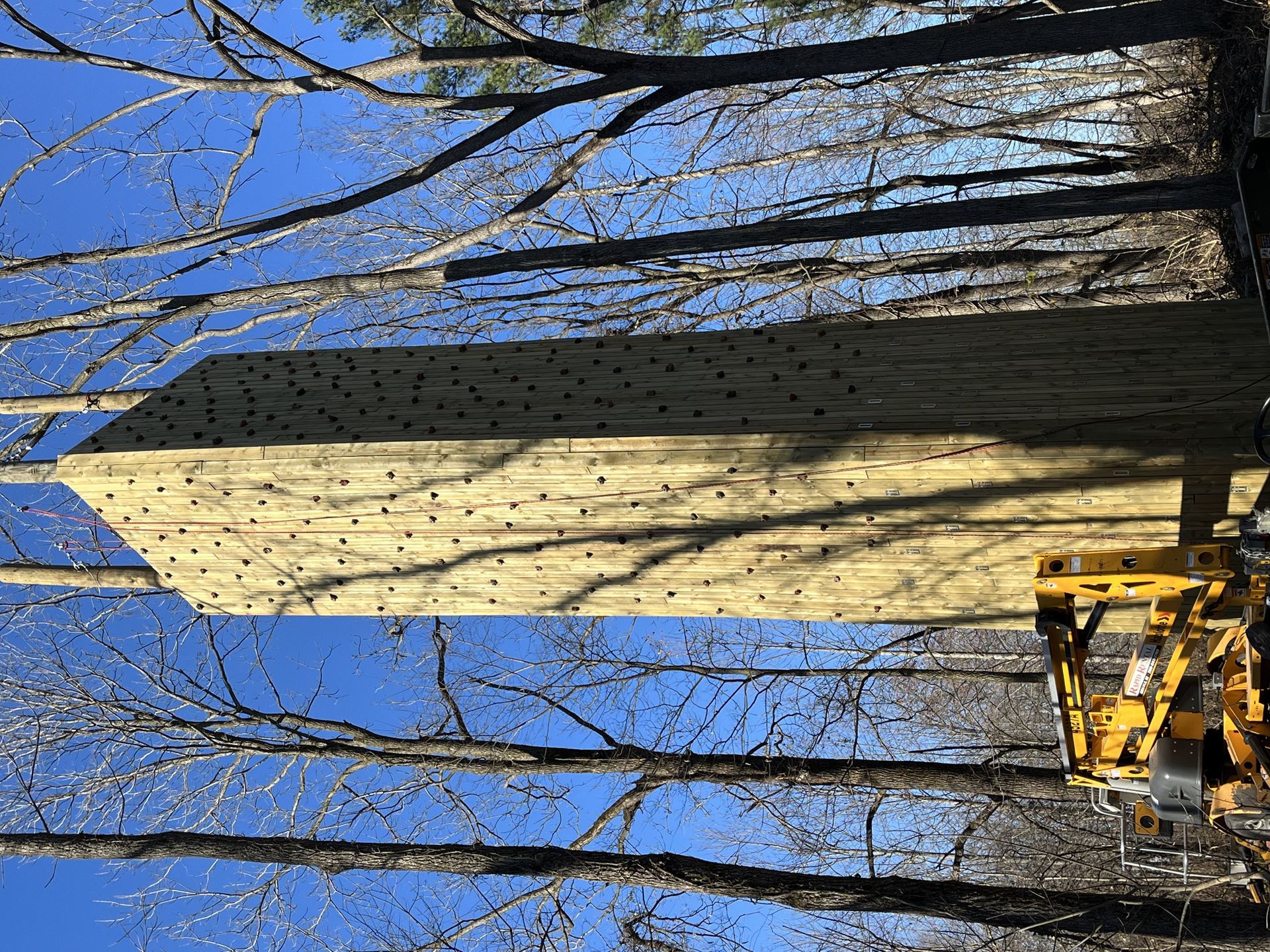 The grant funded construction of a 45 foot climbing tower complete with a platform at the top. It is designed with four climbing lanes, ranging from easy (even the youngest campers could make it up) to challenging (giving experienced retreat guests a run for their money!) The goal of the project was to add an attractional activity that would help to promote camp and give both new and returning campers an exciting element to grow physically, spiritually, and mentally. Before the tower had even been used by guest groups, it was already accompanied by God’s blessing. One of the five core volunteers who constructed all of the vertical climbing faces had attended a local church for a while but never felt a call to get connected or care. When invited to be part of the building team, he felt a push from the Lord and said “yes.” His involvement in this team effort has helped him to engage in discipleship in new ways. The biggest challenge of the project turned out to be a massive blessing, as well. The original company hired to set the telephone poles eventually completely cut off all communication, ghosting them and frustratingly stalling the project. When the camp turned to the local power company for help, they assisted in securing a new (and much praised) location, date and time for the work. When they received the bill for setting the poles they were blown away to find that it totaled just half the cost the original company had quoted!
The grant funded construction of a 45 foot climbing tower complete with a platform at the top. It is designed with four climbing lanes, ranging from easy (even the youngest campers could make it up) to challenging (giving experienced retreat guests a run for their money!) The goal of the project was to add an attractional activity that would help to promote camp and give both new and returning campers an exciting element to grow physically, spiritually, and mentally. Before the tower had even been used by guest groups, it was already accompanied by God’s blessing. One of the five core volunteers who constructed all of the vertical climbing faces had attended a local church for a while but never felt a call to get connected or care. When invited to be part of the building team, he felt a push from the Lord and said “yes.” His involvement in this team effort has helped him to engage in discipleship in new ways. The biggest challenge of the project turned out to be a massive blessing, as well. The original company hired to set the telephone poles eventually completely cut off all communication, ghosting them and frustratingly stalling the project. When the camp turned to the local power company for help, they assisted in securing a new (and much praised) location, date and time for the work. When they received the bill for setting the poles they were blown away to find that it totaled just half the cost the original company had quoted!
Camp Lodestar (Cal-Nevada) - “Ministry In The Trees” Ropes Course
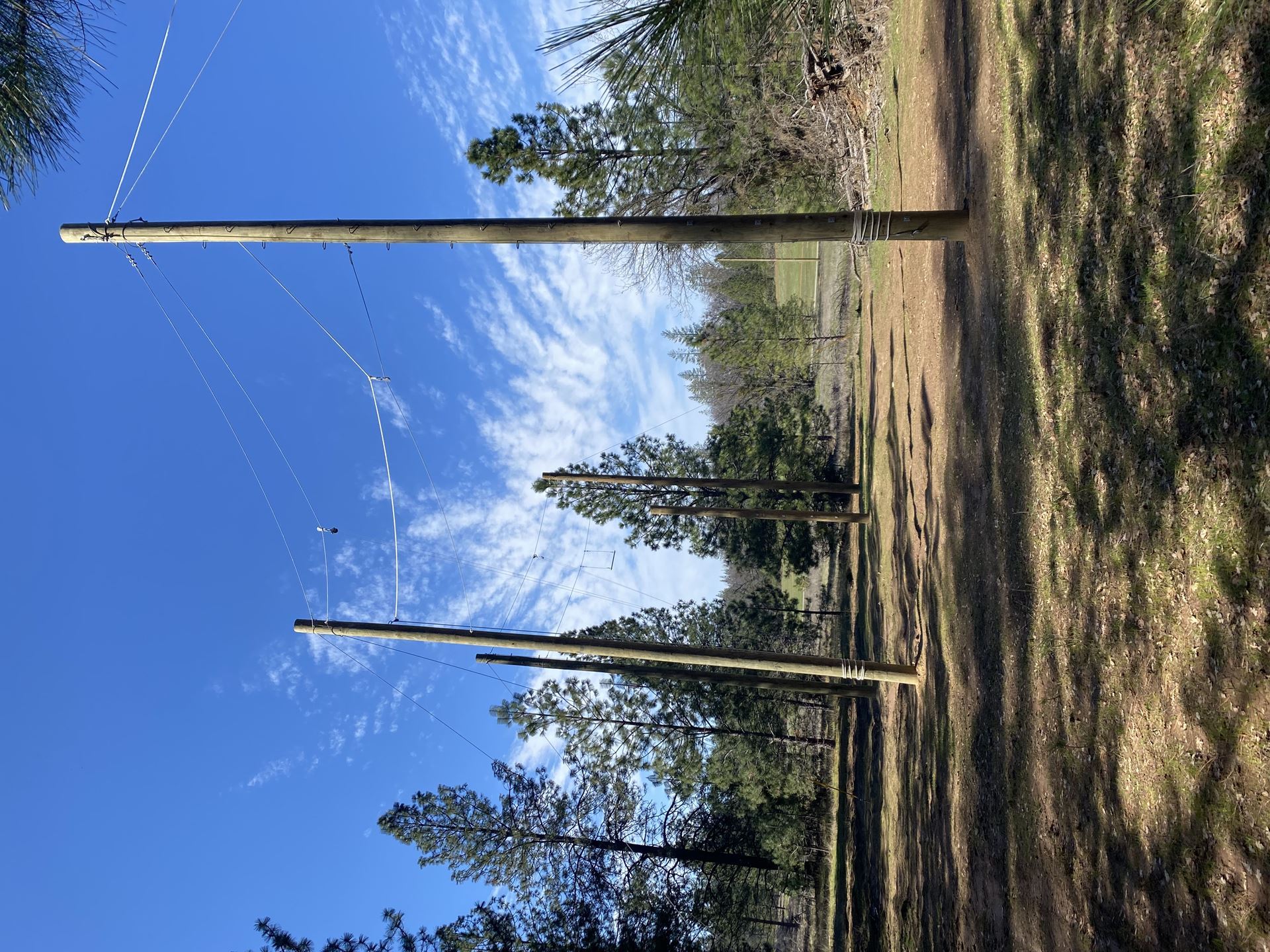 The High Ropes course at Camp Lodestar had been destroyed by a combination of insect infestation, drought, and high winds. The camp received a 2022 grant to begin to rebuild this program area, and this 2023 grant added a new element, the Golden Gate. In this challenge, two teams of folks on the ground must work together to assist the climber in balance. The course is a popular feature to bring in new campers and guest groups. The high ropes elements allow many campers to experience a sense of accomplishment, to learn group encouragement and success, as well as see the world around them from a different, very high, point of view.
The High Ropes course at Camp Lodestar had been destroyed by a combination of insect infestation, drought, and high winds. The camp received a 2022 grant to begin to rebuild this program area, and this 2023 grant added a new element, the Golden Gate. In this challenge, two teams of folks on the ground must work together to assist the climber in balance. The course is a popular feature to bring in new campers and guest groups. The high ropes elements allow many campers to experience a sense of accomplishment, to learn group encouragement and success, as well as see the world around them from a different, very high, point of view.
Lake Okoboji (IA) - Low Ropes Challenge Course
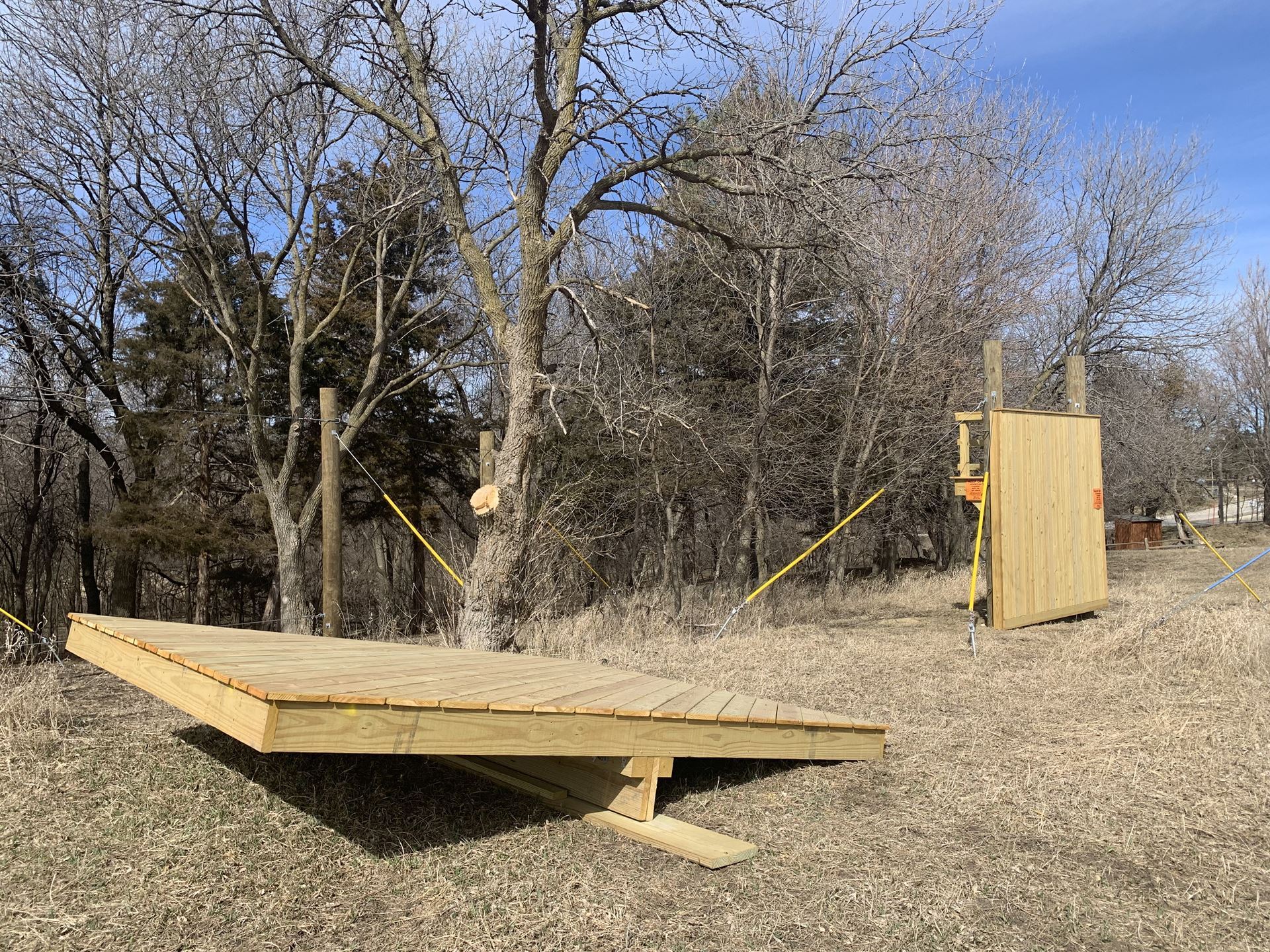 Lake Okoboji has been making strides in connecting with local groups to get more people out to camp. The new 11-element low ropes course is an easy way to bring in church youth groups, school groups, and businesses to visit and experience time together for learning and growth. The challenge course will once again be a regular feature of the summer camp program progression; a wonderful asset since the old challenge course was phased out in 2012. The course provides powerful ways to explore overcoming challenges and difficulties by having faith, putting trust in Christ, and finding support in each other. Isaiah 41:10 says, “...fear not, for I am with you; be not dismayed, for I am your God; I will strengthen you, I will help you, I will uphold you with my righteous right hand.” Campers and guests experience what it looks and feels like to face fear and to trust during challenges in life and on the course.
Lake Okoboji has been making strides in connecting with local groups to get more people out to camp. The new 11-element low ropes course is an easy way to bring in church youth groups, school groups, and businesses to visit and experience time together for learning and growth. The challenge course will once again be a regular feature of the summer camp program progression; a wonderful asset since the old challenge course was phased out in 2012. The course provides powerful ways to explore overcoming challenges and difficulties by having faith, putting trust in Christ, and finding support in each other. Isaiah 41:10 says, “...fear not, for I am with you; be not dismayed, for I am your God; I will strengthen you, I will help you, I will uphold you with my righteous right hand.” Campers and guests experience what it looks and feels like to face fear and to trust during challenges in life and on the course.
Mount Eagle - Intern Tiny House
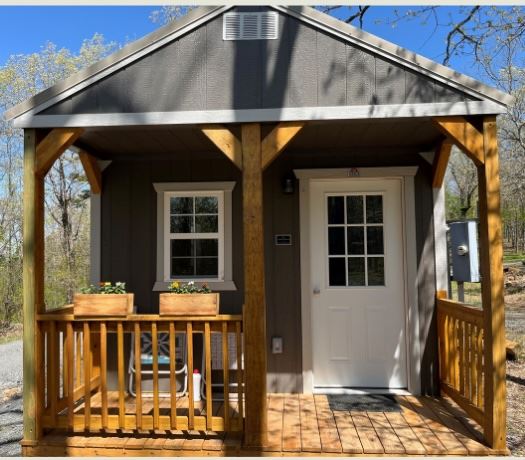 Mount Eagle has been laying the groundwork to start an internship program. Housing was the main roadblock to even consider this type of program and a barrier to hiring additional staff as the ministry grows. Grant funding enabled the purchase of a shed shell and construction (by NOMADS and other volunteers) of a fully functional, cozy tiny house that will accommodate a summer intern. The house will also be available for second-season volunteers and solitude retreats at Mount Eagle. The new lodging enables vision for the intern program to move forward and new ministry opportunities to become possible.
Mount Eagle has been laying the groundwork to start an internship program. Housing was the main roadblock to even consider this type of program and a barrier to hiring additional staff as the ministry grows. Grant funding enabled the purchase of a shed shell and construction (by NOMADS and other volunteers) of a fully functional, cozy tiny house that will accommodate a summer intern. The house will also be available for second-season volunteers and solitude retreats at Mount Eagle. The new lodging enables vision for the intern program to move forward and new ministry opportunities to become possible.
Quinipet (NY) - Otterbein Building Roof
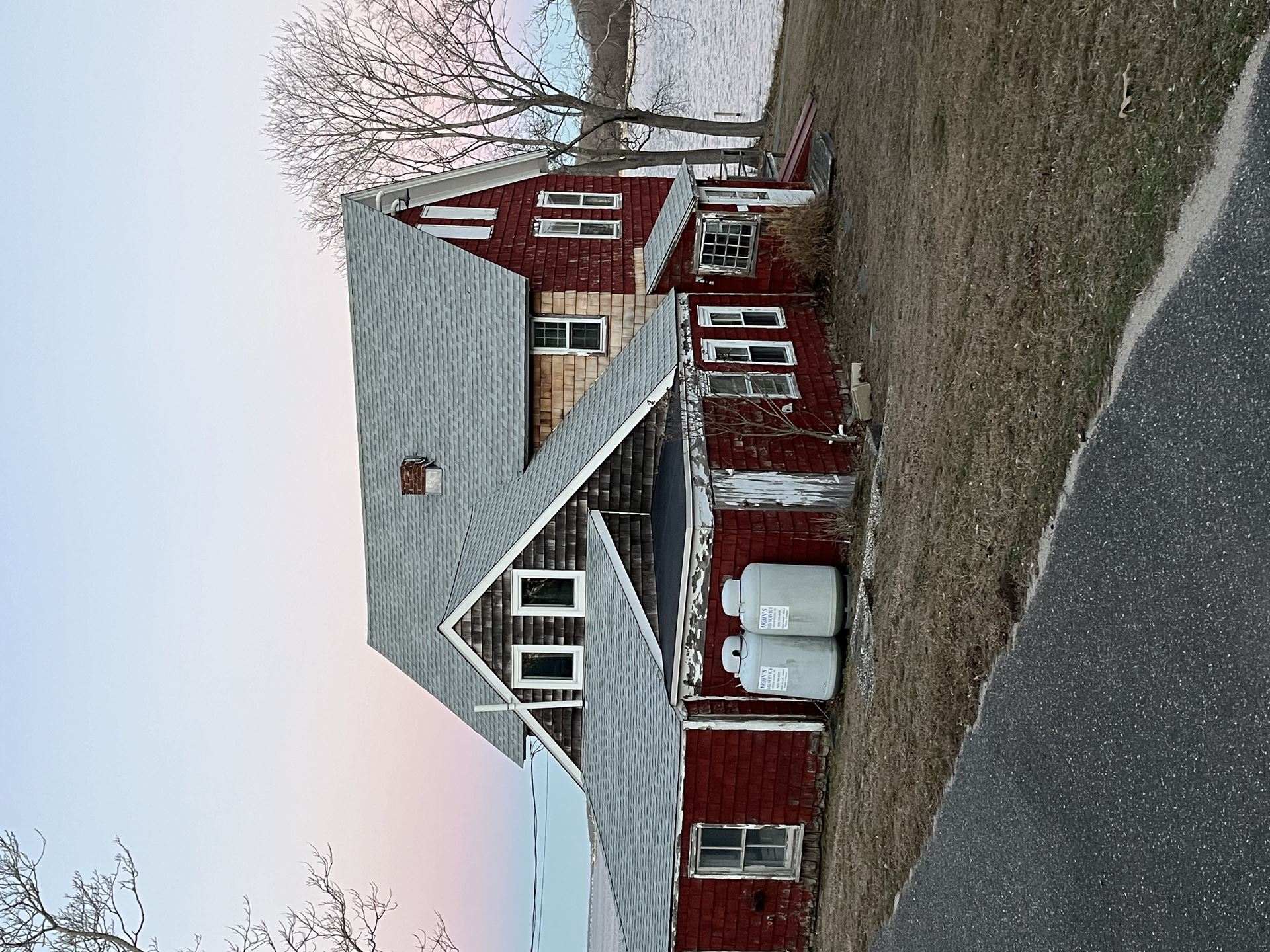
As with many camps, Quinipet is an aging facility operating with limited funds. Protecting a building starts with a good roof, and the historic Otterbein building badly needed a new one. The new asphalt shingled roof is the first step in renovating this historic structure, which will increase the camp's capacity to house interns and pastors on retreat. The sparkling new roof has inspired donations and fresh energy for the next phase of the restoration.
Watch for more Ministry Impact Grant reports in the coming weeks and months as we feature all of the amazing projects made possible through the 2023 grants.

